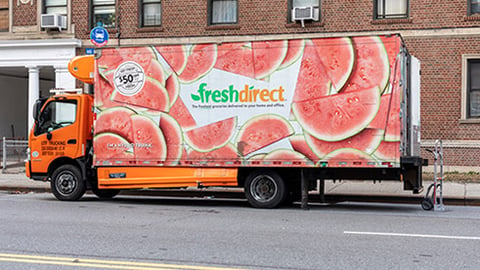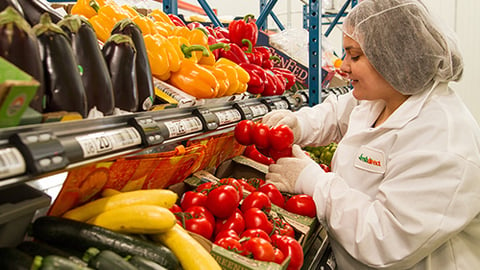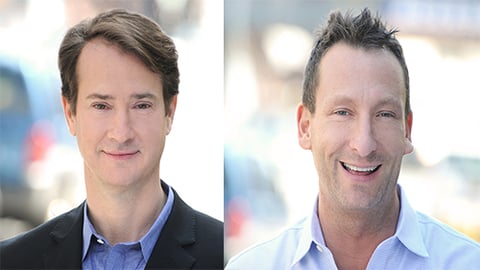FreshDirect Equal to Ecommerce Delivery, Sourcing Challenges
Progressive Grocer was invited to FreshDirect’s Bronx, N.Y., campus – where it moved from its former Long Island City, N.Y., digs last July – to check out the pure-play e-grocer’s new home.
After a whirlwind tour of the extensive state-of-the-art facility, conducted by COO Tim Knoll and Chief Merchandising Officer Scott Crawford –Progressive Grocer’s Bridget Goldschmidt sat down with CEO David McInerney and Chief Growth Officer P.J. Oleksak to find out the company’s approach to deliveries and food sourcing, as well as what they see as the future of grocery ecommerce, in part 2 of our interview with the executives ...
Progressive Grocer: In terms of transporting and delivering food, what are the most challenging products to get right and make sure that they come in peak condition?
David McInerney: For sure, it’s the fresh food, and that runs the entire gamut. There are two pieces to that. The first piece is the consumer’s expectation is that everything should always be perfect. That’s very, very challenging when it comes to fresh food that isn’t always necessarily perfect.
We buy strawberries from a farm in California. You want strawberries that are really ripe and red. The challenge with that is the riper they get, the more fragile they get. So you want to handle them as little as possible by taking out things like distribution centers and allowing them to go directly packed … at the farm onto the truck, come straight across to one location. When they land here, they come on a pallet and go directly in front of the pick phase. And now we’re picking those strawberries directly from that pallet directly into the customer’s bag. While those strawberries are sitting there resting at the pick phase, they’re also at the right temperature. That helps quality.
When you think about fruit, and you think about citrus now, these [Sumo Citrus seedless mandarins, which were offered in bowls in various locations at the time of Progressive Grocer’s visit] happened to be really fantastic. That’s why they’re around me.
Progressive Grocer: Right, I noticed that.
DM: We put fruit around [the office] every day, and it changes throughout the season. These are really good right now because this is the end of the season, and they’re picking. You can even open it up and try it. You see how easy they peel, too, right? Part of our strategy is to get people to eat the food that’s best at a particular time.
Let’s just take fruit. Fruit changes throughout the year. These are particularly good right now. Six months from now, in June and July, citrus just isn’t going to be good. People don’t know that, so they’re still going to order citrus. Our way around that is our star rating system. What we do is, we have a team of people that go through and rate every single prototype, and we have over 600 items. And they literally do just that. They cut them, and they taste them, and they give it a rating of one to five stars. One star means it’s not good, don’t buy it. And that’s a very counterintuitive retail thought, to sell something that you’re saying isn’t good.
Our thought there is full transparency, building trust. Now conversely, at the same time, there will likely be another product that’s really good, that we may rate it four or five stars. Because the consumer trusts us, they will buy the four- or five-star item, and not buy these that we may have to sell. We may have to sell citrus in the summer.
So we’re naturally affording a better experience. And we do the same thing in seafood, right? Because part of the challenge that online is, how do you replicate that experience that a consumer is used to having when they walk into a store and say, “What’s good today?” By going onto our site and seeing what’s good and what’s rated high on seafood, we’re naturally giving them the better products. That’s No. 1.
No. 2 is, how do you get those good products in the first place? How do you – even if it isn’t citrus season – get the best citrus? We have devoted years, 10-plus years, of teams of people traveling around the world. What we focus on is identifying the best specialist growers. So there’s a grower for this orange. There is a fisherman for [our] swordfish. There’s a fisherman for our codfish; there’s a grower of our lamb and our turkeys. We found the best ones.
Then we took it a step further and convince them to give us the top 10 percent of what they have in their crop. So now we’re at least starting with great product, right? So we identified a source, we can buy that product, we have to get it here as quickly as possible. We then have to get it to the customer as quickly as possible. But before we even get to the customer, we have to process it. We have to filet the fish, we have to cut the meat, we have to either wash or pick the produce. We have to pack it carefully and get it to them. So it’s a relatively sophisticated system to actually get a really great piece of fish or a great piece of meat or a great cheese to a customer.
Progressive Grocer: So what happens to the products that get the one-star rating? Are there people who will order them anyway even though, you’ve said, pretty much, don’t buy them?
DM: Yeah, yeah.
Progressive Grocer: Buy at your own risk, is that it?
DM: And there’s less of them, right? So there’s significantly less people that will buy something that’s one star versus five stars. There were some items people just need to have, right? They just want oranges all year. Maybe they’re going to juice them, who knows? The other piece of it is, we really back off on those items, right? So we’ll have on our site, probably 20 different, 15 different citrus items today. When we get into June and July, you may see three or four. Right? So we manage and curate the assortment regularly, because, again, we’re doing the work of driving the consumer into what we think is best.
Progressive Grocer: I see. So, you go all over the world to source stuff, right?
DM: I used to. The team does, yes.
Progressive Grocer: Right, OK, the company does. But how important is local as a philosophy or as a business strategy?
DM: Super-, super-important. And here is why local is so good. It’s for what we just talked about. Local is seasonal, and whenever you eat seasonally, you’re going to end up with better product. Part of the challenge today is, there are no real seasons anymore because of modern transportation. And product can come from all over the world, and we have greenhouses. So consumers are hard-pressed to understand even when tomato season is. But the reality is, [it’s] in August and September, and even early October. [That’s when] I have the best tomatoes in the Northeast.
We have a high, high commitment to local growers. What we’ve found is local growers were really, really great at just that. At growing. They were not great at marketing, and they weren’t great at logistics. So we took that burden onto us. And the deal, the relationship that we built with these growers was, it’s our responsibility to market and build a brand for you. And it’s our responsibility to get the product from you. So we have our own fleet of trucks and drivers that are out at these farms picking up every day, which allows the growers to do what they do best, which is grow.
We have a lot of local growers, from [New York’s] Long Island to upstate New York to New Jersey. And the reality is, even down to Virginia. But the important piece is, they are relationships that we’ve fostered over time, and there’s a strong direct connection with them.
Progressive Grocer: Do you feel that your FoodKick service, which offers a curated selection of foods, is the future of ecommerce as something ever more customized?
P.J. Oleksak: We are super-proud of what we’ve built with FoodKick, and that FoodKick/FreshDirect combination is a really strong, competitive positioning. We believe that together, there’s just really nothing stronger on the market. When you think about FoodKick, it is doing two things for us as an enterprise. It is facilitating a need for our existing customer base on the FreshDirect side, because we know that fresh [food] doesn’t necessarily last seven days. You need a fill-in shop towards the end of the week, or you have a spontaneous moment in your life where you just need something that you had had not planned for in your week.
So it has added an extra level of service and opportunity to take care of our existing customer base, and it’s really offering a service to a totally different customer base as well that … doesn’t live in a planning mode. They don’t know … how many meals [they’re] going to have at home. So it’s servicing a different customer base as well. We think together, the combination is really powerful as we expand, and we are excited about the success we’ve seen with the FoodKick model. It is a proven model that customers have responded incredibly well to, and it’ll be a big part of our expansion strategy, but together as an enterprise, the two [components].
Note: Interview has been condensed and edited for clarity. Read part 1 of the interview, in which McInerney and Oleksak discussed their company’s growth potential, and how ecommerce has evolved over the years.






